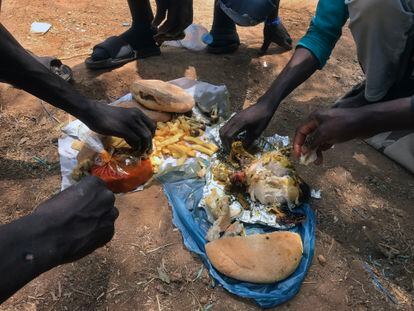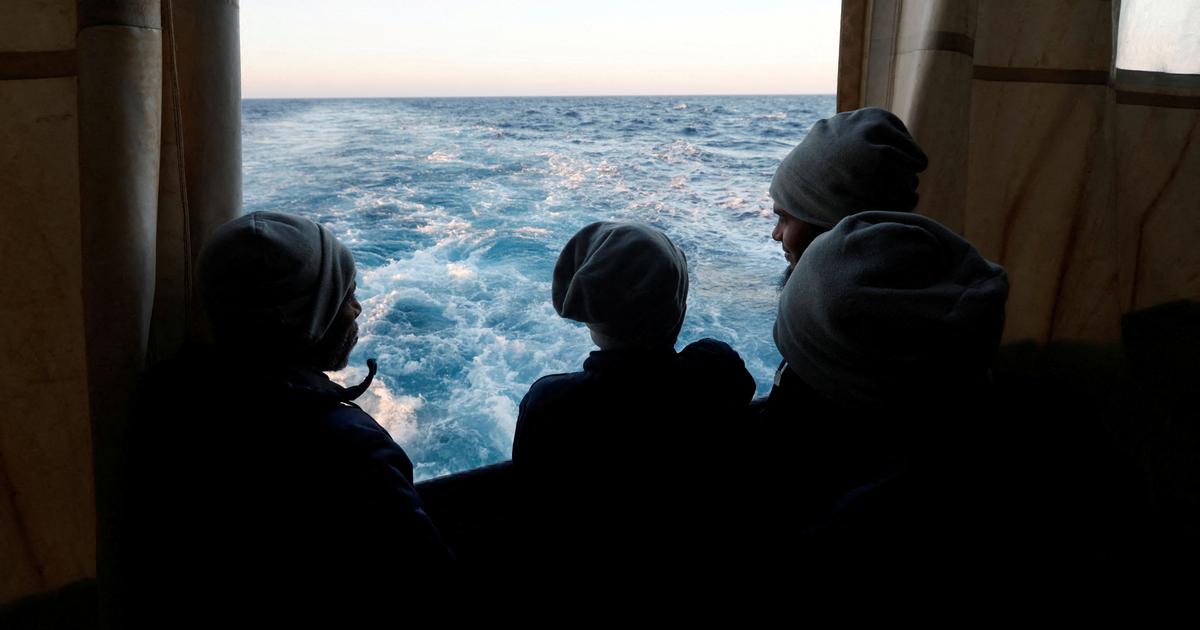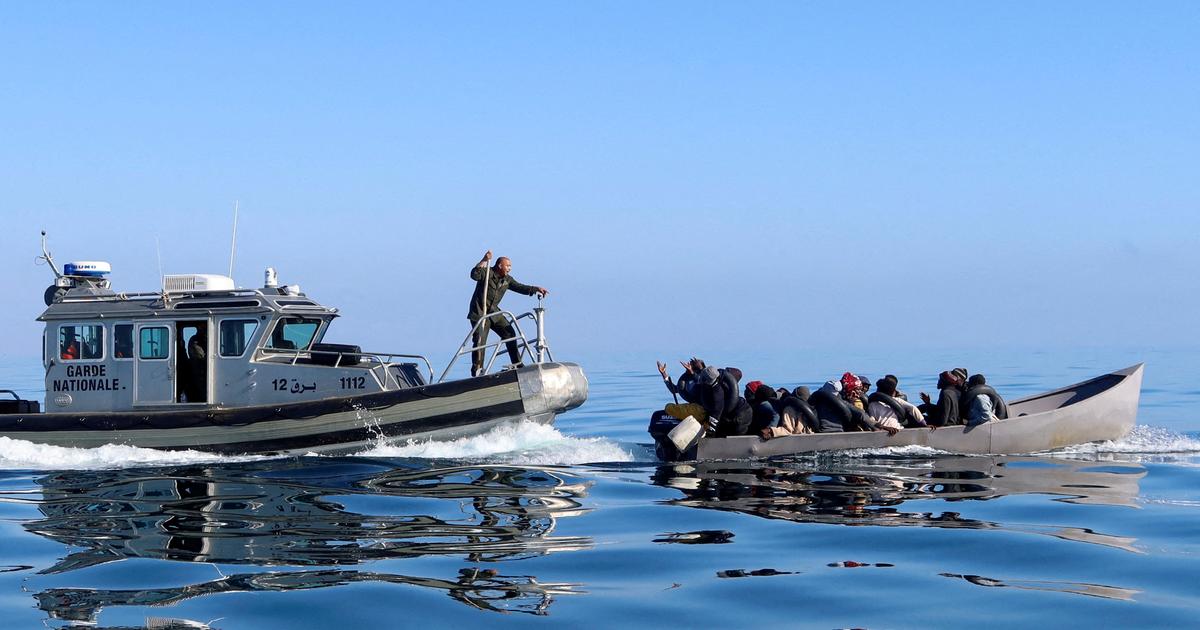Moroccan security agents escorted 21-year-old Azdin, a refugee from Sudan, onto a bus, drove 11 hours southwest, then left him at the bus station in Beni Mellal, the capital of Morocco's second-poorest region, situated in the country's north -Inner center.
Azdin had no money, no food, no cellphone, no first aid supplies.
One month after a mass attempt to breach the border fence in Melilla, an exclave city belonging to Spain, Azdin is still trapped in this impoverished town.
And he's not the only one.
The forced expulsion of migrants from the Spanish border has left more than 200 people — mostly from Sudan, some from Mali — living in desperate conditions on the streets of Beni Mellal, with no way to leave.
Some have broken legs and feet, many have infected wounds covered by old, filthy bandages.
Azdin's only advantage is that he knows this city well: it's the 10th time Moroccan authorities have sent him here — once for each failed effort to jump the fence.
The collective attempt last month left at least 23 people dead.
Beni Mellal is the punishment inflicted on hundreds of migrants and refugees detained by Moroccan security agents in their attempt to reach the Spanish enclaves of Ceuta and Melilla.
Lately, the city has served as the main destination for migrants forcefully transferred after being arrested at the border, but there are many others: Ouarzazate (a 12-hour drive from Nador, the Moroccan city bordering Melilla), Fquih Ben Salah (eight hours from Nador), Chichaoua (10 hours), Errachidia (seven and a half hours), Kalaat Sraghna (a little over nine hours) — places far away from the border, extremely poor, and very difficult to leave.
Young men with little to no resources — those who, like Azdin, have no friends or family who can send them €20, €30, or €50 — spend months living on the streets, waiting to catch a bus that will take them back south,
For years, the government has detained and expelled migrants who attempt to reach Europe through Morocco's northern border with Spain's North African enclaves, banishing them to faraway cities or ditching them in the middle of the desert.
It doesn't matter whether they have papers identifying them as refugees: police hunt them down in raids, detain them before they reach the fence, beat and arrest them as they try to climb it, load them onto buses with police escorts, and then head south.
This strategy of forcefully removing migrants and asylum-seekers to the country's poorest and most remote cities is a key pillar of the Moroccan government's war on irregular migration.
Forced relocation wears migrants down, exhausting them both physically and emotionally, and separating them from friends and traveling companions,
making their journey even more difficult, dangerous, and deadly.
Despite the cruel and controversial conditions in which these transfers are carried out, they continue to occur on a regular basis, on a massive scale.
EL PAÍS made repeated attempts to contact Morocco's Ministry of Interior for comment, but never received a response.
The road to Beni Mellal passes through small towns with dirt roads and little to no cell service, where the main luxuries are cows, lukewarm water, and a store selling cans of tuna in tomato sauce.
The city, which sits at the feet of the towering Atlas Mountains, can appear charming at first sight, to those who have just made the long and desolate journey there.
Even more so since the first thing one sees, as the heat melts the asphalt, is a large castle, perched atop a lush, tree-covered hill, next to an apartment complex with a swimming pool.
But this mirage of comfort quickly fades away, revealing the real city, and the reality of its more than 190,000 inhabitants.
Unemployment and extreme poverty are visible everywhere: in the tattered and filthy blankets the city's street vendors use for sleeping in the dirt;
in the beggars sprawled out on the sidewalks, delirious in the heat of the day;
in the woman rescuing stale watermelon slices from a trash can;
in the Moroccan teenager with gelled hair, wearing his best shirt de ella, begging for a job.
It's visible, too, in what is absent — in the aftermath of 30 years of out-migration, as many of the city's residents themselves chose to migrate.
Also irregularly, also to Europe.
In many of the city's cafes, water is served from repurposed motor oil jugs.
At the city bus station — a simple building with salmon-colored walls — 18-year-old Ahmed, from Sudan, loiters around, then enters an adjoining café, unfazed by the commotion of the vendors, beggars, and travelers returning home after Eid al-Adha, Islam's biggest holiday.
The bus station in Beni Mellal.
Javier Bauluz
Ahmed has a wound on his ankle that's becoming infected — the result, he says, of being beaten with a baton by a Moroccan police officer.
The soles of his feet from him are worn raw from walking barefoot: in addition to stealing his money and cellphone, Ahmed says that security agents took his shoes from him as well.
"Bah!
It's not a big deal!”
he says, laughing.
According to government authorities, the mass crossing in Melilla on June 24 left at least 23 people dead.
But the Moroccan Association for Human Rights (AMDH) says the death toll is higher, with 27 confirmed dead and 64 disappeared.
On top of surviving that tragedy, Ahmed is fleeing war in Sudan, and he does not want to make a big deal of his comparatively minor injuries from him.
He's a vulnerable teenager playing tough.
He has no other choice.
The death of Abdenacer
Ahmed arrived in Beni Mellal on June 25, the day after the tragedy in Melilla.
Police loaded him onto a bus — just like the one that brought Azdin here.
“They took us away from Nador in 36 different buses, at least,” Ahmed says.
“We left at about seven in the evening, after hours left lying on the ground, and arrived around six the next morning.
There were at least 35 people on my bus and one of them died en route.
They offloaded the body when we got to Beni Mellal.
We didn't even have water;
we had to buy it from the police who were escorting us.”
The young man who died on Ahmed's bus was from Darfur, Sudan.
His name was Abdenacer Mohamed Ahmed.
His identity of him was verified by AMDH.
Ahmed says that seven other buses took the same route as his.
If his calculations of him are correct, that means some 280 people were abandoned in Beni Mellal.
The majority are Sudanese refugees, a group that has become increasingly prevalent on migration routes to Spain since 2020. Many have left Beni Mellal and are now in Casablanca or other cities to the north, making their way back to the border.
But others remain stranded in the city.
With nothing.
“There are still about 170 or 180 of us here,” Ahmed estimates.
The group of refugees, including Ahmed and Azdin, have started to organize, and last Friday they began registering the names of their members in a notebook.
In just a few days, and only counting those in their immediate vicinity, they'd managed to register 64 people, including at least 10 minors.
“They send you to the farthest place possible so that it's harder to get back,” explains Bashir Hamid, a 27-year-old Sudanese migrant who has been expelled 15 times to this and other cities far from the border.
Bashir made this same journey over and over again, back and forth over the course of a year, until he finally managed to cross into Melilla on June 24. “Sooner or later, everyone comes back.
If you have money, as soon as you step off the bus, you get right back on another one.”
For years, migrants have shared similar stories of being beaten, pushed back, detained, and forcefully displaced from the Spanish border, and human rights groups have long condemned the practice.
But it continues to happen.
In addition to internal expulsions, the Moroccan government also deports people to their countries of origin and orchestrates forced expulsions to Algeria, where authorities dump migrants in the middle of the desert with no food or water.
These forced transfers are carried out with no oversight or transparency, and it remains unknown whether the EU includes them in its official statistics claiming that Morocco has successfully prevented the departure of over 40,000 Europe-bound migrants.
According to Moroccan researcher Ali Zoubeidi, an expert on migrant smuggling and border security,
“the practice of displacing people to cities in the country's interior contradicts Morocco's focus on maintaining humane migration policy.
It's a violation of the human rights of migrants.”
Stranded for three months
Refugees in Beni Mellal consider themselves lucky to be expelled during the olive and orange harvest seasons (winter through spring), because it's easier to find work.
A day laboring in the orchards pays about 85 dirhams, or a little over $8 — enough for those who find work to buy food to share with the rest of the group.
But this time of year, there's no harvest and no work.
Maybe a few hours here or there on a construction crew, but not much else.
Hustling up enough money to afford a bus to Casablanca or Rabat (about $10) and enough savings to survive on the road takes time.
The last time Azdin was here, he was stranded for three months.
It's 1pm on Friday afternoon, and the temperature has already climbed to 106 degrees.
A group of Sudanese are resting under the shade of a tree, their stomachs empty.
Two burly Moroccan men — quite possibly members of the motley crew of government spies that's been following and keeping tabs on EL PAÍS' movements in Morocco — approach the group of migrants offering three bags of food.
There's couscous, chicken, bread and French fries.
“They're only doing this because you guys are here,” one of the migrants explains.
“The Moroccan authorities don't let people help us,” another boy adds.
They share the food with a Moroccan who, like them, is living on the street, and then offer one of the bags to the group of journalists.
Five hours later and the streets are still boiling at 110 degrees, but the city is already starting to come alive.
Teenagers come out to play soccer, and women walk to the cafés — never alone, and almost always surrounded by children.
The grassy parkway on Mohamed VI Ave. — the greenest space in downtown — is overflowing with people.
The group of Sudanese gather in a corner of the park, near the bus station where they were first dropped off.
There are dozens of them, playing cards, sleeping, selling cigarettes and tea, typing on the few phones they have, or simply observing their surroundings in silence.
Many are hobbling around on crutches or limping, their bodies covered in old bandages, their wounds still festering.
A small Sudanese boy appears, looking no more than 12 years old.
Among the locals, their presence of him has become totally normalized,
even if some of the city's poorest feel slighted: “Why are you so worried about the Sudanese?”
grumbles a neighborhood shoeshiner, "We have it just as hard as they do, if not more."
All around the grassy gathering spot, laundry hangs out to dry on improvised clothes lines and tractor tires are strewn about, serving as sofas.
Nearby, a partially-constructed building has been turned into a temporary hiding place for a group of Malian refugees who, like the Sudanese, are fleeing conflicts that have forced hundreds of thousands more to leave their homes.
The assembly
Refugees in Beni Mellal spend most of the day with no food.
They rely on charity, or on the support of their companions who manage to find a few hours of work.
The refugees are afraid, and the group is reluctant to speak with journalists.
They call an assembly to decide whether they should speak to EL PAÍS.
In Melilla, Oujda, Casablanca and Rabat, Sudanese refugees have been more than willing to tell their stories and denounce what happened at the fence, but in Beni Mellal, they are terrified.
“We're afraid the Moroccan authorities will punish us,” one person explained.
"They could hunt us down and beat us, or leave us in the desert to die."
There are some in the group who want to give interviews, but the older, more experienced migrants — the leaders — are against it.
Only Azdin and Ahmed agreed to speak in detail about their situations, but that was before the group had called the assembly.
The reluctance of Sudanese migrants to speak with journalists belies the stated commitments of Moroccan, Spanish and EU authorities to shared principles of humane migration management.
The governments' latest joint press release, issued on July 8, claims that “respect for fundamental rights is a value shared by Morocco and the European Union,” and describes the North African country as a “strategic partner” with one of the “most advanced” migration management models in the world.
The assembly lasts two days, with many insisting that speaking to EL PAÍS isn't worth the risk of reprisals from the Moroccan government.
In the end, the group decides to write their own press statement, and agrees to let EL PAÍS take a few photos.
Five days later and out of the country, EL PAÍS received a WhatsApp message with images of the statement the group had promised.
Written on five sheets of pink, looseleaf paper, it related accounts of harassment at the hand of Moroccan police in the migrant camps of Nador;
described the experience of approaching the fence in Melilla, and of the people they lost along the way;
and provided testament to the brutality of the Moroccan and Spanish security forces who attempted to stop them.
They repeatedly insisted that they are not gang members or criminals, as the Moroccan press has claimed.
And they said that the number of dead in Melilla is much higher than has been reported.
On the statement's final page, the group posed a series of questions to the Moroccan authorities — all effectively rhetorical, since no one will ever answer them: “How many of those killed in Nador were from Sudan?
And have you told their families?
Or do they still not know?
Translated by Max Granger















